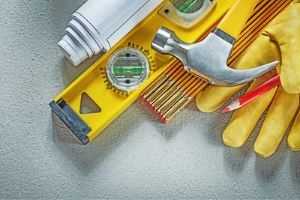It’s here. The kids dread it. You love it. It’s back to school season! But now it’s your turn to get schooled too. This article will teach you all you need to know about the basics of electrical safety.
From cord safety to childproofing, we’ve got you covered. Consider this your study guide for all things electrical, and transform your home into an even safer space for you and your family.
DIY Solutions May Not Be Best
Although you may think your electrical system is extra complex, there are many things you can do around your home to ensure you and your family are safe from an electric mishap.
These things are simple fixes that we know we were always told but we sometimes forget. Here are some major do’s and don’ts for when you tackle those at-home electrical projects.
 Don’t overload your circuits: One easy way to avoid an electrical outage, surge, or worse, a fire, is to be aware of the amount of power your circuits can handle. By overloading your circuits and plugging too many high power appliances in at once, you run the risk of quickly harming your electrical system.
Don’t overload your circuits: One easy way to avoid an electrical outage, surge, or worse, a fire, is to be aware of the amount of power your circuits can handle. By overloading your circuits and plugging too many high power appliances in at once, you run the risk of quickly harming your electrical system.- Don’t take on a project that is too advanced for your skillset: If you’re here reading Electrical 101, that probably means you aren’t ready to rewire your whole home. Truthfully evaluate the project at hand and whether you have the expertise to complete it. If you have any doubts, it is probably much safer to call a professional.
- Do turn off the power before starting your project: And I mean completely switch off the breaker before attempting to work with any wiring or circuitry in your home. This will save you a shock or full-on electrocution.
With these tips in mind, your project should run smoothly as long as you have at least a general understanding of how your electric system works.
The Importance of Smoke Alarms
 An integral part of your electrical system and your safety is the smoke detector. These tiny machines save lives every single day by alerting families of minor and major fires in their homes.
An integral part of your electrical system and your safety is the smoke detector. These tiny machines save lives every single day by alerting families of minor and major fires in their homes.
To make sure your smoke alarm is functioning correctly, check the batteries at least once every month. Then make sure to replace them if the alarm does not sound.
You should replace your smoke alarms about every 10 years to be sure that the technology is up to date. If you live in a large home, you may need to have multiple smoke alarms in places like the kitchen and bedrooms.
Don’t let this life-saving device go to waste in your home. Keep up with your smoke alarms just as you would with the rest of your favorite home appliances.
Baby-Proofing Your Home
 Perhaps the most important lesson to take away from this article is that your electrical safety needs can change depending on your specific situation.
Perhaps the most important lesson to take away from this article is that your electrical safety needs can change depending on your specific situation.
Here are some ways to get ready if you will be bringing a new baby into the home. Be aware of your outlet plugs.
These can be a choking hazard for your baby and should only be in the home if they are too big to be a choking hazard. Don’t purchase outlet plugs that are colorful, as these will attract the baby to the outlet. Tamper-resistant outlets aren’t necessarily childproof.
Although these outlets require two objects inserted at equal pressure to connect electrically, these are not necessarily childproof. A child may still be able to activate the electric current, and this could potentially harm the child. Now that you’ve had a refresher on the basics of electrical safety, share this article with friends so that they can get schooled too!



 Finding the right electrician for your home goes beyond looking through the Yellow Pages and selecting a contractor at random.
Finding the right electrician for your home goes beyond looking through the Yellow Pages and selecting a contractor at random. In addition to having a trusted, go-to electrician, you should also be familiar with an electrician who lives and works in close proximity to your home.
In addition to having a trusted, go-to electrician, you should also be familiar with an electrician who lives and works in close proximity to your home. Home improvement TV shows and the internet make virtually any and all DIY project seem doable.
Home improvement TV shows and the internet make virtually any and all DIY project seem doable.
 Electrical shock
Electrical shock Professional electricians have more than knowhow - they also have a full range of tools that make repairs safe. One of the most common tools in any set is a voltage meter.
Professional electricians have more than knowhow - they also have a full range of tools that make repairs safe. One of the most common tools in any set is a voltage meter. Before you strap on your tool belt and try a repair on your own, be sure to give your local electrician a call.
Before you strap on your tool belt and try a repair on your own, be sure to give your local electrician a call.
 Ever catch yourself in a shocky situation and think nothing could possibly go wrong? Because of your ... shoes? Maybe even gloves!
Ever catch yourself in a shocky situation and think nothing could possibly go wrong? Because of your ... shoes? Maybe even gloves! Although for some it may be more than obvious, light and electricity are not the same thing. Yes yes, electricity can be bright and this is why we use it in light bulbs, see it in lightning, and even witness it in our own TV screens.
Although for some it may be more than obvious, light and electricity are not the same thing. Yes yes, electricity can be bright and this is why we use it in light bulbs, see it in lightning, and even witness it in our own TV screens. NOT! Simply put, electricity is electricity no matter what band it belongs to. Even though rubbing your feet on a carpet, hair on a balloon, or a simple fingertip touch may seem entirely different from electrocution, all these forms of electricity are the same.
NOT! Simply put, electricity is electricity no matter what band it belongs to. Even though rubbing your feet on a carpet, hair on a balloon, or a simple fingertip touch may seem entirely different from electrocution, all these forms of electricity are the same.